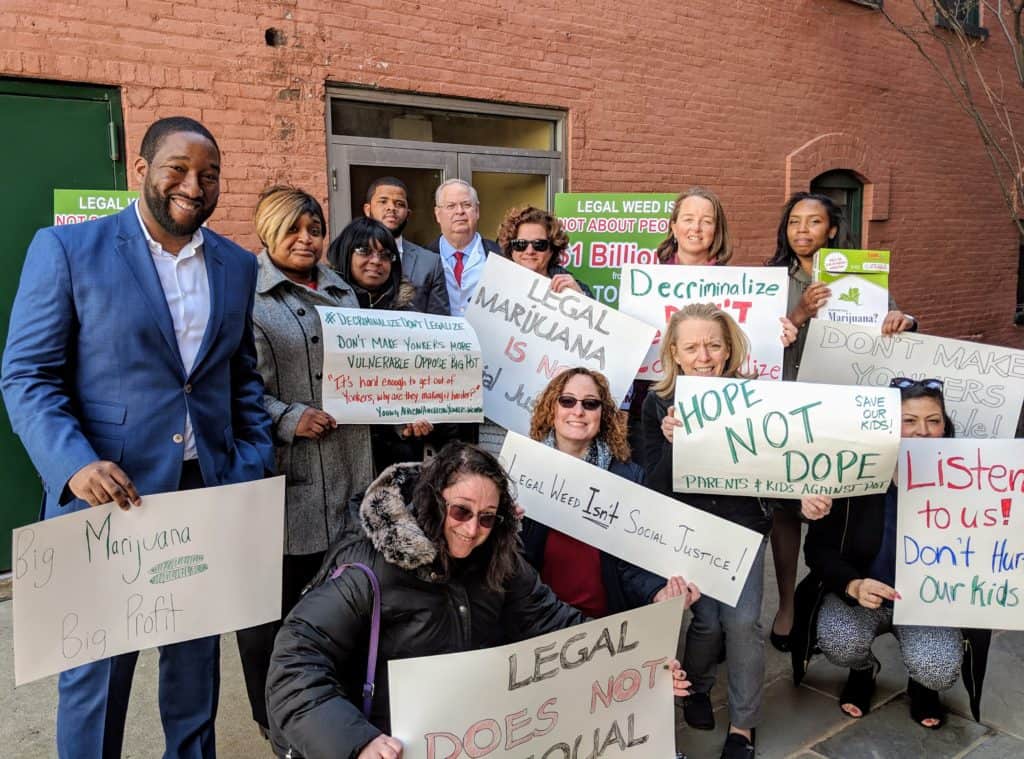
By Dan Murphy
Opposition in Westchester County to legalizing the sale of marijuana, if New York State opens the door to do so by passing a “pot law” this spring, has gained momentum, with a number of local governments and organizations warning against the opening of dispensaries in the county. If Gov. Andrew Cuomo and a majority of state legislators in the Assembly and Senate vote to legalize pot, the decision that local and county governments will have to make is whether to permit the sale of marijuana in their communities.
State Sen. Peter Harckham held a public forum in Mahopac last month, in which northern Westchester and Putnam County residents were split on whether Westchester or Putnam should “opt-out: of permitting the sale of marijuana in their communities.
In attendance advocating for the legalization of marijuana were leaders from the National Organization for the Reform of Marijuana Laws, whose Hudson Valley Chapter President Roger Green said that in the ten states that have legalized pot, there has been no significant increase in drug use by minors. Another positive development with legalizing marijuana in New York, Green said, is that other, more dangerous forms of marijuana – like synthetic pot – could be outlawed.
Another argument in favor of legalizing marijuana is that if pot were legal in neighboring states, then New York residents would drive to that state to purchase pot, with New York not receiving any taxes or fees from it. In November 2018, the first recreational marijuana stores in Massachusetts began legally selling marijuana, and while it is not legal to purchase and transport marijuana from Massachusetts to New York, it is now a common practice.
But opposition to legalizing marijuana and permitting its sale was expressed by several at the forum. The harris project, founded by Stephanie Marquesano, who lost her 19-year-old son Harris to drug abuse and mental health, said that marijuana poses a danger to young adults under the age of 25, and asked state legislators to slow down before passing any laws.
Another organization committed to opposing the legalization and sale of marijuana in New York, Smart Approaches to Marijuana-New York, held a press conference outside of the Westchester office of State Senate Majority Leader Andrea Stewart-Cousins’ office to urge her and other democrats to “put the brakes” on legalizing pot.
SAM-NY’s argument against legal pot is that states which have welcomed commercial weed have seen significant health and public safety impacts, underperformance in tax revenue and little meaningful social justice reforms, and that the same pattern would continue in New York.
According to Robert Driscoll from SAM-NY: “Counties across New York, including neighboring counties of Putnam and Rockland, have already expressed opposition to commercial pot sales in their communities and lobbying by ‘Big Marijuana’ continues to increase the likelihood that the state’s market would be dominated by an industry with a history of victimizing low-income and minority communities. And counties across the state continue to express an intention to opt out of the program, and lobbying by Big Marijuana increases the likelihood that the state’s market would be dominated by an industry with a history of victimizing low-income and minority communities.”
Also at the event, SAM-NY participants, including State Senate candidate Julie Kilian from Rye, called on Stewart-Cousins to take the conversation out of the current state budget debate and allow for a full dialogue about the impacts and concerns before taking a vote. And that appears to be what has happened in Albany recently.
Gov. Andrew Cuomo has removed legalizing pot from his budget proposal, and any vote to legalize marijuana will take place either at the end of the state legislative session in May/June, or next year.
Here in Westchester, local governments are moving forward with legislation to ban the sale of marijuana in their towns and villages, if pot is ever legalized state wide. But those laws, if passed, could be overturned in the courts, because the only way to stop the sale of pot in Westchester would be for county government to “opt-out” and make it illegal to sell marijuana across Westchester.
County Executive George Latimer is waiting to see what happens in Albany, first. “The New York State Legislature and Gov. Andrew Cuomo are currently contemplating legalizing marijuana for adult use,” he said. “While it is unclear if the proposal will pass now, or at a later date, some neighboring counties have already declared they will be ‘opting out.’ While I respect their decision to draw a line early on, here in Westchester County I prefer to wait. We need to wait and see what becomes law, and in what form. Further, it is possible that there may not be an opt-out clause in a final document.
“While opting out may be a provision of the final bill, it should be noted that it does not affect the legal use or possession of marijuana in the county. The impact that it will have is to prohibit the sales or cultivation of marijuana within that county.
“The issue is being intensely debated in the community at large, with both pro and con arguments raised. That advocacy should be directed to our state officials, who have the sole authority to pass or deny legalization or decriminalization.
“Should the measure pass this year, and should a county opt-out provision be included in the law, our administration and the Board of Legislators will meet to determine how to handle our role in the matter. Until then, we welcome all opinions and arguments on either side, as befits our policy of inclusion of all public input,” said Latimer.
Only the City of Yonkers could make its own vote, or determination, whether to allow the sale of pot or to opt out.





